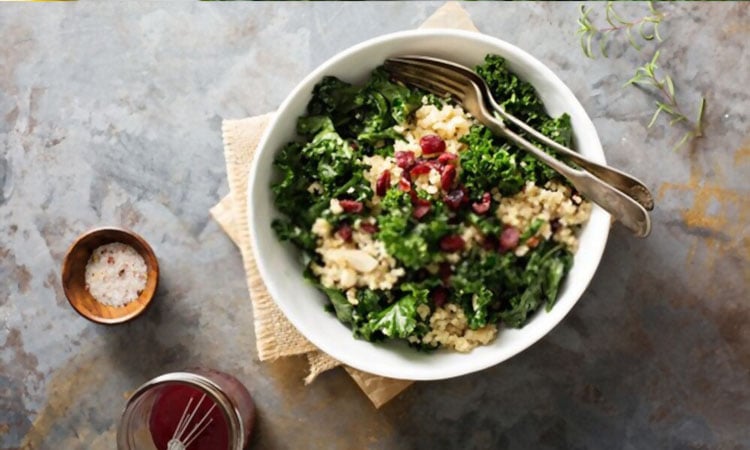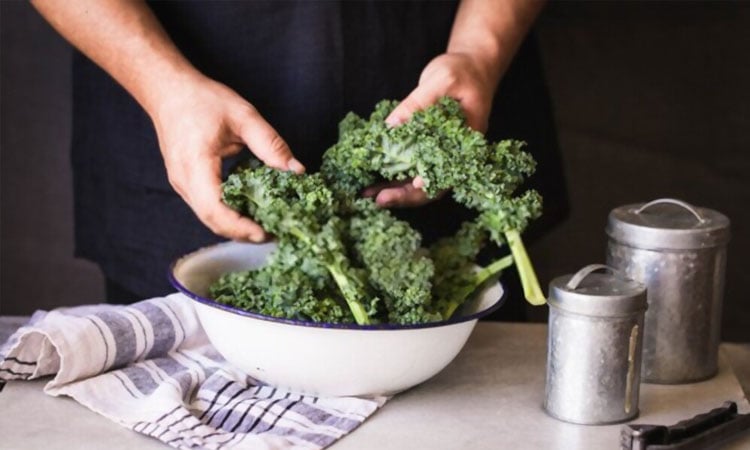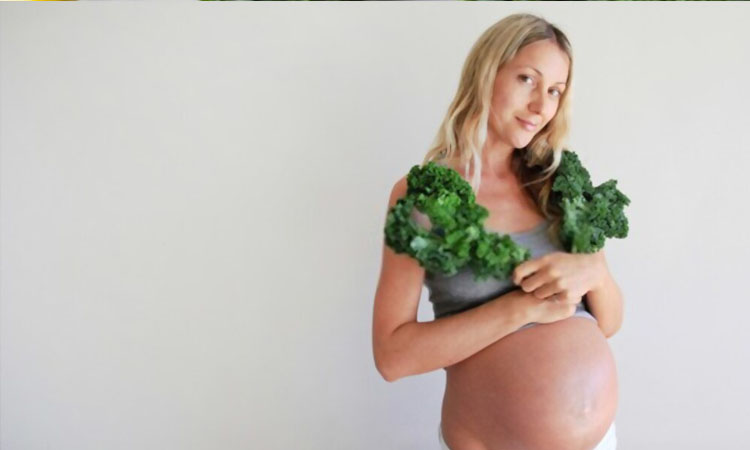Pregnancy is all about eating healthy and nutrient-rich foods. Eating kale during pregnancy is one of the best additions to your prenatal diet. The dark-green, leafy vegetables is loaded with key nutrients and has some excellent benefits for expecting mothers. But it can also be tough to eat kale during pregnancy – thanks to the unappealing smell that resembles Sulphur.
Kale During Pregnancy – The Nutritional Composition
Belonging to the cabbage family known as Brassica Oleracea, kale is hugely popular in Europe and eaten both raw and cooked. While naturally, boiling kale does diminish some of its nutrient value, it still largely remains a powerhouse of nutrition.
Kale offers you calcium, iron, phosphorus, vitamins A, C and K. Kale also contains some greatly potent antioxidants and also has magnesium, copper, vitamins B6, B1, B2 and B3.

Kale also contains fibre, proteins and very little calories. Most of kale’s fat is the omega- 3 fatty acid alpha linolenic-acid which can reduce hypertension by a great deal.
How Many Varieties Of Kale Are There?
Kale comes in different varieties and is available in most grocery stores all the year round. This cruciferous vegetable comes in four main types, and the choice of type of kale being used depends on the dish, the texture and the preferred taste.
- Curly kale: Perhaps the most common type of kale available in the grocery stores, curly kale can be baked into chips or made into soups and smoothies. Curly kale also makes for a good stir-fry dish. They have a pungent, peppery flavour, with younger leaves having milder aftertaste
- Redbor kale: The pretty kale with frilly, curled leaves and a distinct deep red, maroon colour with hunts of purple, redbor kale has a wonderful flavour and can be eaten raw or cooked. You can also use it for ornamental purposes and it takes dishes to the next level when used as a garnishing
- Lacinto kale: If you are looking to add kale in your salads, then lacinto kale, popularly known as Tuscan kale or Dinosaur kale should be your pick. It has narrow, dark green wrinkled leaves with a meatier flavour. Also a preferred choice for sautéed vegetables, lacinto kale has mild astringent properties
- Russian (Siberian) kale: Dark green, red stemmed Russian kale is harder to find, but is flavoursome and milder than the other varieties of kale. The leaves have a sweet taste, with a little hint of a peppery flavour between bites. Siberian kale is also used in soups or added to your regular meals until it is soft and tender to eat
Related Reading: 21 Pregnancy Superfoods To Include In Your Pregnancy Diet
Benefits Of Eating Kale During Pregnancy

Found abundantly in the winter season, the dark green leafy kale is nowadays available at most grocery stores all year round. As is with all green vegetables, kale too is a nutritional powerhouse and is absolutely safe to eat during pregnancy. Eating kale during pregnancy has some nutritional advantages too, as listed below –
1. Vitamin A
Pregnant women are generally susceptible of vitamin A deficiency, which is crucial for the development of baby’s eyes, heart lungs, kidneys, bones and other systems. Most pregnant women are advised to have vitamin A supplements, but you can get it naturally from kale.
Calculate Due Date With LMP
2. Fiber
Pregnancy is the time when tummy troubles like constipation bother most women. By including kale in your diet, you can up your daily required fiber intake and keep these discomforts at a bay. A 100-gram bowl of boiled kale leaves contains about 2 grams of fiber, and just a single serving of kale will boost your overall digestive health. Thus, eating kale can be added to the list of easy home remedies of preventing constipation during pregnancy.
3. Vitamin C
Vitamin C will not only help you boost your immunity during pregnancy, protecting you from common infections like cold and cough, but also reduces your chances of developing pregnancy anemia. Vitamin C is also crucial your baby’s physical development as well. Kale has about 200% vitamin C of your daily value in a 100-gram bowl. Need I say more?
4. Magnesium
Magnesium intake during pregnancy helps in relaxing muscles – so a bowl of kale when you are tired will give you energy and stamina. Magnesium intake also helps treat leg cramps, and prevents the uterus from contracting pre-maturely. Magnesium is also responsible for your baby’s strong teeth and bones.
5. Calcium
Did you know that kale contains more calcium than dairy products? Well, a bowl of 100 grams of kale has 150 mg calcium. Calcium intake is indispensable during pregnancy as it helps in the development of the baby’s bones and teeth. Appropriate levels of calcium can prevent the mother from hypertension and pre-eclampsia as well. Make sure you have enough calcium rich foods in your diet for the two of you!
Related Reading: Top 10 Calcium Rich Foods For Pregnancy
6. Vitamin K
Among all green vegetables, kale has the highest vitamin K content, giving you another reason to include it in your pregnancy diet. By including enough vitamin K in your diet, you reduce the chances of serious bleeding, because it helps the blood to clot. Moreover, it helps in keeping the blood vessels strong when your body has 50% more blood.
7. Anti-inflammatory properties
Kale has been found to contain 45 different flavonoids with a variety of antioxidant and potent anti-inflammatory effects. The omega-3 fatty acids in kale also help fight against arthritis, asthma and autoimmune disorders1.
Kale Pregnancy Recipes

As you can see, eating kale during pregnancy offers a lot of benefits and is a must for every pregnant woman. Kale can be consumed in a variety of ways suiting your taste.
- Kale juice recipe for pregnancy: Make yourself a powerful nutrient dense juice with some apple and kale leaves. Take care to only use mildly flavoured small leaves. You may also add some palak or spinach leaves to it to mellow down the taste of kale. A dash of honey will add on to the sweetness of this apple-palak-kale juice and you’d not need to add any sugar. Filling and nutritionally rich as it is, you can experiment further by adding Amlas or bottle gourd
Related Reading: 11 Healthy And Refreshing Juices During Pregnancy To Drink
- Make kale into salads: Add kale to your regular salad, and up your dish on the health scale. You can look to replace lettuce, or add both greens to your salad bowl. Just top with some lemon vinaigrette and you are good to go!
- Make kale into smoothies: Bananas, yogurt, a spoon of flax seeds, a little water and a few kale leaves work up an easy yet tasty smoothie in a blender. Kale smoothie for pregnancy can be made more interesting by topping it with some lime juice for the zing. Replace bananas with avocadoes, and yogurt with almond milk if you’d like. Add a few strawberries, cherries and blackberries and take it to the next level
- Make kale into soups: A soup will become super healthy by just adding some kale into it – you can drop in a few leaves into the broth or simply use it as a topper
- Make kale into chips: Put that oven to some good use and make kale chips to munch on whenever you wish to snack. Kale chips are crispy and you really can’t stop at one! Now that’s really called healthy snacking!
- Kale in pasta: Pasta and kale seem to like each other- they complement each other really well. Adding Parmesan cheese and some lemon will make you want to eat kale all the more
To make sure kale tastes the best, always remove the center ribs first. If you are averse to the taste, cut the leaves into thin ribbons and marinate them in lemon juice, salt and some pepper for a few minutes.
Conclusion

The nutrient powerhouse that is kale is one of the best prenatal foods you can lay your hands on. With just a bit of technique, kale can be made into tasty recipes that will boost your health, and help your developing baby first.
